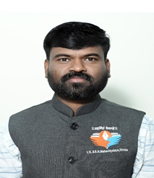Department of Political Science
1) About:-
The Department of Political Science was established in 1983 in Vishvasrao Naik Arts, Commerce and Baba Naik Science Mahavidyalaya Shirala, Dist. Sangli. The Department offers B.A. course to the students. At present, 1 faculty member has the department. The teaching-learning method of the department includes seminars with active student participation, Classroom lectures, movies on the course-related topics, PowerPoint presentations.
Occasional internal evaluations like Viva, written class tests, class presentations are held to evaluate students’ performance. Apart from the academic activities the department also organizes various programs and encourages students to participate in many activities to help build up their morale and boost their confidence. The department faculties also share a very amicable relationship with the students and create a favorable environment so that the students can access and approach the teachers with their problems if any.
Mission
The Butler Political Science Program, distinctively grounded in a firm commitment to social justice, democracy, and human rights, engages students in the study and practice of politics to promote the collective good at the local, national, and global levels. The program defines politics broadly as the formal and informal ways societies govern themselves. The program offers an innovative curriculum that crosses traditional disciplinary boundaries to provide students with the knowledge and skills necessary to pursue positive social change.
Goal
- To recognize their role as responsible and effective members of communities to promote positive social change.
- To develop knowledge of political theories, identities, behavior, movements, structures, and institutions in local, national, and global settings;
- To develop skills, such as critical thinking, analytical reasoning, and written and oral communication, necessary to engage effectively in the study and practice of politics in order to become fully realized thinkers, professionals, and community members; and
- To develop the ability to make connections between theory and practice, between global and local events, and across academic disciplines.
2) Faculty Members:-
| Name of Faculty | Qualification | Designation | Photo |
|---|---|---|---|
|
Dr. Raosaheb Satwa Kamble 9822573160 raosahebkamble2009@gmail.com |
M.A. M.Phil., Ph.D., NET & SET | Associate Professor |  |
3) Syllabus:-
| Sr.no. | Description | Download |
|---|---|---|
1. |
B. A. II Political Science syl 2019 |
|
2. |
B.A Part- I Nep Political Science Syllabus |
|
3. |
B.A.I Political Science syl 2018 |
4) Facilities:-
• Laptop
• Projector
• Internet
• Wi-Fi
• CDs & DVDs
• Mentor-Mentee
5) Linkages and Memorandum of Understanding (MOU):-
1) Shri. Vijaysinha Yadav College Peth Vadgaon Kolhapur
